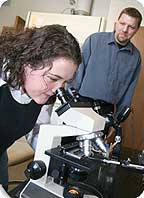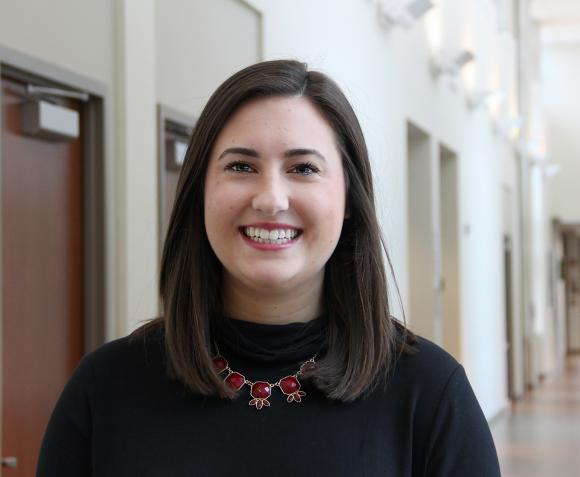In the Genes
 Going into the home stretch of senior year, Christin Molnar is hitting her stride. In three months she’ll graduate with a biology degree. Her applications to pharmacy school are in. And her joint research project with Professor Don Paetkau, “Cloning a Drosophila Suppressor of Retinal Degeneration,” is starting to bear exciting results.
Going into the home stretch of senior year, Christin Molnar is hitting her stride. In three months she’ll graduate with a biology degree. Her applications to pharmacy school are in. And her joint research project with Professor Don Paetkau, “Cloning a Drosophila Suppressor of Retinal Degeneration,” is starting to bear exciting results.
Cloning what?
At many colleges, undergraduates rarely do hands-on science research with professors. That comes later, in graduate school. But at Saint Mary’s, every biology major carries out independent research with a faculty mentor. In fact, it’s a graduation requirement.
Molnar and Paetkau are studying the genes that cause inherited retinal degeneration in fruit flies. They have financial support for their work from the College’s Student Independent Study and Research (SISTAR) grant program.
“Humans and flies have similar eye genes, and so we can use the flies as a model for humans,” Molnar explains. “If we can understand how fly eyes degenerate, we can understand how human eyes degenerate. If we can fix something in the fly eye, we can potentially, in the longer term, fix something in the human eye.”
The SISTAR grant gave Molnar a $3,500 stipend and on-campus summer housing, allowing her to immerse herself completely in research.
In the lab at Saint Mary’s, she logged countless hours cloning the gene needed for the project. Next, she did the delicate and difficult work of injecting hundreds of tiny fruit fly embryos with the DNA, and also sent the DNA to be injected professionally. Now, she and Paetkau want to see if the genetic trait they are looking for appears in the progeny of flies that were mated in the lab.
“I’m hoping that in the next two matings we’ll have qualitative results,” Molnar says. “This is the best part … I knew what I should see, and now I’m seeing it.”
Molnar thinks her experience will give her a leg up in pharmacy school. “Research doesn’t just give you knowledge about the subject you’re working on—it gives you a lot of other things … like a work ethic, determination, and drive.”
Saint Mary’s supportive environment has also given her a boost, she believes, since graduates of women’s colleges are more likely to choose science careers. “It’s been invaluable,” she says of her education. “I know that, had I gone somewhere else, I wouldn’t have pursued biology as far.”

